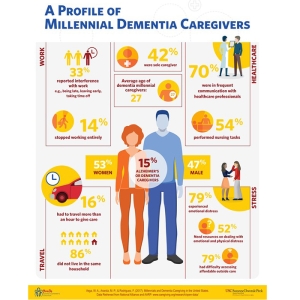One in six millennial caregivers cares for someone with Alzheimer’s disease or other dementia, study finds
December 04, 2017- Research
A new report, Millennials and Dementia Caregiving in the United States, released today by the USC Edward R. Roybal Institute on Aging and UsAgainstAlzheimer’s, shows that one out of six millennial caregivers cares for someone with dementia. With the prevalence of Alzheimer’s disease and other dementias expected to reach nearly 16 million in the U.S. by 2050 from 5 million today, more millennials and young Americans are expected to face caregiving responsibilities in the future.
“Caregiving to family members with dementia can be a full-time job. Caring for the millennial caregiver is a societal investment with the potential of delaying family burdens and healthcare costs in the future,” said María Aranda, associate professor and interim executive director at the USC Edward R. Roybal Institute on Aging.
With the prevalence of Alzheimer’s disease and other dementias expected to reach nearly 16 million in the United States by 2050 from 5 million today, more millennials (those born from 1980 to 1998) are expected to face caregiving responsibilities in the future.
The analysis provides information about the characteristics of millennials caring for someone with Alzheimer’s disease or other dementias, examines the caregiving activities they perform and the burden they experience through caregiving, and how their caregiving activities interfere with their workforce participation. The report also makes policy and programmatic recommendations for addressing these challenges.
The report analyzes data from the nationally representative study, Caregiving in the U.S. 2015, conducted by the National Alliance for Caregiving and AARP.
Key findings
- Generational status: About one out of six millennial caregivers is caring for someone with dementia, with an average age of 27 years.
- Sole caregiver: Roughly 42 percent of millennial dementia caregivers are sole caregivers and the overwhelming majority (79%) reported that accessing affordable outside help was very difficult.
- Travel and transportation: Most millennial dementia caregivers (84 percent) do not live in the same household with the person they care for, and 16 percent had to travel more than an hour to provide care.
- Caregiving activities: The most common caregiving activities include helping with transportation (79 percent), shopping (76 percent), and communicating with health care professionals (70 percent).
- Emotional distress: Caregivers feel emotional distress (79 percent) was a major caregiving burden and wanted more help to deal with this hardship.
- Interference with work: About one out of two millennial dementia caregivers said that caregiving interfered with work, and 33 percent reported consequences led to losing job benefits or being fired, among other impacts.
Policy and programming recommendations
The report outlines solutions to address the challenges faced by young adults who act as caregivers for individuals living with Alzheimer’s or other dementias, including:
- Improving transportation solutions by developing in-home medical services for the patient and telemedicine options, partnerships between ride-sharing providers and medical systems, and piloting of autonomous cars to connect caregivers and care partners to medical and social services.
- Increasing access to information through the development of tailored training programs and support groups that account for the cultural and age-specific needs of millennials, as well as developing psychosocial and emotional support interventions that address the unique challenges and needs of younger caregivers.
- Enhancing communication with health care providers by developing online communication platforms, technologies, and tools that help young caregivers track symptoms and medications, and executing care strategies for their care partners.
- Introducing flexible work arrangements, including flexible work hours and telecommuting to make alternative work arrangements more widely available, including at the beginning of employees’ careers. Expanding paid leave policies to support family caregiving is another critical step.
To reference the work of our faculty online, we ask that you directly quote their work where possible and attribute it to "FACULTY NAME, a professor in the USC Suzanne Dworak-Peck School of Social Work” (LINK: https://dworakpeck.usc.edu)
